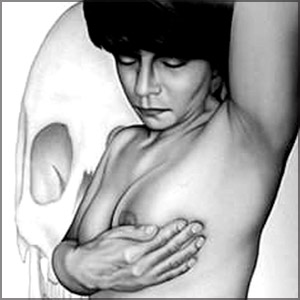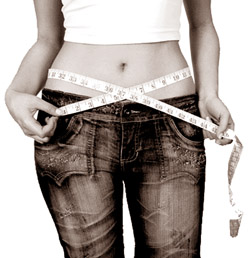
Breast Cancer
 The breasts (mammary glands) are a pair of glandular organs that
produce milk in response to the hormonal changes of childbirth. They're
mainly made up of fatty tissue, which starts high on the front of the
chest and extends down and around into the armpit. They are supported by
ligaments and large muscles. The breasts (mammary glands) are a pair of glandular organs that
produce milk in response to the hormonal changes of childbirth. They're
mainly made up of fatty tissue, which starts high on the front of the
chest and extends down and around into the armpit. They are supported by
ligaments and large muscles.
Each breast has 15 to 20 lobes with a number of lobules and ducts
surrounded by fatty and supportive tissue. Each lobule has about 30
major ducts that open onto the nipple. The darker area of skin around
the nipple is called the areola. At the edge of the areola there are
large glands that produce fluid to lubricate the nipple.
In each armpit there are about 20 to 30 lymph nodes (glands), which
drain fluid from the breast. These form part of the lymphatic system
that helps the body to fight infection.
It's common and perfectly normal for one breast to be larger than the
other.
The nipples usually point forward, although they may look different
on each breast. It's not unusual for one or both nipples to be turned
inwards (inverted). This can be present from birth or can happen when
the breasts are developing. The nipples themselves are hairless, but
some women have a few hairs around the areola. A small number of women
have an extra breast or pair of breasts. These are usually in the lower
armpit and are known as accessory breasts. Some women have an extra
nipple or nipples. These are usually below the breast or above the belly
button. Accessory breasts and extra nipples aren't usually a problem and
don't need to be removed.
Breast development
The breasts are constantly changing from puberty, through adolescence
and the childbearing years and into the menopause affected by changing
levels in the female hormone oestrogen.
For most girls, breasts start to develop around the age of nine to
11, but it can be earlier or later. It's not unusual for the breasts to
grow at different rates. Breast lumps can occur while the breasts are
developing.
These are always benign and don't usually need any treatment once
they've been diagnosed.
Just before a period, your breasts may become larger, tender or feel
a bit lumpy.
Once the breasts have developed, changes linked to the monthly
menstrual cycle (cyclical breast changes) are common. Just before a
period, your breasts may become larger, tender or feel a bit lumpy.
After a period, this lumpiness becomes less obvious or may disappear
altogether (although some women may have tender, lumpy breasts all the
time). Many women also experience breast pain linked to their menstrual
cycle (cyclical breast pain).
During pregnancy, the breasts get much larger as the number of
milk-producing cells increases. The nipples become darker and may remain
that way after you've given birth.
Around the menopause lumps are common. These often turn out to be
breast cysts (benign fluid-filled sacs).
Breast tissue also changes with age. It begins to lose its firmness
and the milk-producing tissue is replaced by fat, making the breasts
sag. This is more noticeable after the menopause, when oestrogen levels
fall. As you grow older, your breasts may change size too. If you take
HRT (hormone replacement therapy) your breasts may feel firmer and
sometimes quite tender.
Breast awareness
Every woman should be breast aware throughout her adult life. It's an
important part of caring for your body. It means knowing how your
breasts look and feel normally, so you notice any changes that might be
unusual for you. Get into the habit of looking at and feeling your
breasts from time to time.
There is no set way to do this. You can decide what you're
comfortable with and when it's convenient for you. You don't have to
look and feel at the same time.
Consultant GP
See your GP as soon as possible. Don't worry that you may be making
an unnecessary fuss and remember most breast changes aren't cancer, even
if they do need treatment or a follow-up. When your GP examines your
breasts he or she may be able to reassure you that there's nothing to
worry about.
If the change may be connected with your hormones, your GP may ask
you to come back at a different time in your menstrual cycle.
Alternatively, he or she may decide to send you to a breast clinic for a
more detailed examination.
Breast screening
As 80 per cent of breast cancers occur in women over the age of 50.
Report any changes to your GP without delay, even if you've had a
recent mammogram.
A small number of women will be asked to come back for further
investigations after attending a routine mammogram.
This doesn't necessarily mean you have breast cancer. It's more
likely to be because the mammogram is unclear, or because it shows up
something that needs further tests.

Five-point code
The Department of Health recommends that instead of examining your
breasts every month for abnormalities, you follow this five-point code,
which is much more effective at detecting changes and abnormalities.
Normal and abnormal
Women of all ages should be aware of the normal appearance and
texture of their breasts. The following can be normal:
One breast bigger than the other
Nipple inversion
Accessory breast/nipple (two to five per cent)
Lumpiness
Tenderness or pain
During the menstrual cycle, some women experience enlarged, tender,
lumpy breasts and these symptoms settle after the period. But some women
experience lumpy, tender breasts all the time.
During pregnancy, breasts become larger as the milk-producing cells
multiply. It's normal for the nipples to get darker and the blood
vessels to become more prominent.
As you age, breast tissue loses its elasticity and it's normal for
breasts to sag. During the menopause, your breasts may shrink (as a
result of the reduction in oestrogen), although sometimes they do get
larger. The nipples may alter, as the major ducts behind them get
shorter and wider. Get to know what is normal for you by:
- Feeling your breasts every day until you're familiar with their
texture and how it can change through the menstrual cycle - Look and
feel your breasts regularly, whenever it's convenient for you.
Changes
Once you're aware of what's normal for you, it's important to look
out for changes in your breasts. You should look out for any of the
following:
- A change in the shape of the breast (pulling of the skin, visible
swelling) - Changes in the nipple (pulling in) - Swelling in the armpit
- Lumps or thickening that feels different from the rest of the breast
Look and feel
Whenever is convenient for you:
- Look at your breasts in the mirror and notice how they fall and
move as you raise your arms - Look at the position of your nipples -
Feel your breasts from time to time
Report changes to GP
The majority of changes will be normal. Your GP may:
- Ask you to return at another time in your menstrual cycle - Refer
you to a breast clinic - Invite you to attend routine screening if
you're between the age of 50 and 70
Routine screening
Between breast-screening appointments, it's important that you
continue to be breast aware and follow the five-point code.
BBC Health
Sleep deprivation as bad as alcohol impairment, study suggests
 Night owls take note: new research offers yet another reason to get
more sleep. In a study published this week in the British journal
Occupational and Environmental Medicine, researchers in Australia and
New Zealand report that sleep deprivation can have some of the same
hazardous effects as being drunk. Night owls take note: new research offers yet another reason to get
more sleep. In a study published this week in the British journal
Occupational and Environmental Medicine, researchers in Australia and
New Zealand report that sleep deprivation can have some of the same
hazardous effects as being drunk.
Getting less than 6 hours a night can affect coordination, reaction
time and judgment, they said, posing "a very serious risk." Drivers are
especially vulnerable, the researchers warned.
They found that people who drive after being awake for 17 to 19 hours
performed worse than those with a blood alcohol level of .05 percent.
That's the legal limit for drunk driving in most western European
countries, though most U.S. states set their blood alcohol limits at .1
percent and a few at .08 percent. The study said 16 to 60 percent of
road accidents involve sleep deprivation.
The researchers said countries with drunk driving laws should
consider similar restrictions against sleep-deprived driving.
The British Medical Association warned that there are other problems
associated with sleep deprivation beyond impaired motor skills. People
who get too little sleep may have higher levels of stress, anxiety and
depression, and may take unnecessary risks.
And the dangers aren't limited to drivers. People who work long
shifts or night shifts, such as medical personnel or other emergency
workers, may also have troubles. CNN
You and your baby
How does a conception occur
By Dr. Vijith VIDYAVIBUSHANA,
Consultant Gynaecologist, Castle Street Hospital for Women
The basic requirement for a conception to occur is the egg (Ovum)
meeting the sperm.
This happens in the outer portion of the fallopian tube which is a
part of female reproductive system. This process is called
Fertilization.
The man should have healthy viable and normal sperms which are moving
forward. Once sperms are deposited in the vagina, they travel through
the neck of the womb to the cavity of the womb and then to the Fallopian
tubes.
Although sperms die within hours after ejaculation they can survive
up to a maximum of seven days once they are inside the womb. Once the
egg is released from the ovary, it is caught up by the outer part of the
Fallopian tube which is called fimbria end. As soon as the egg is caught
by the fimbria , it is transported to the part of the Fallopian tube
where fertilization is taking place.
Movement of fine hair like structure of the lining of the Fallopian
tube helps this movement of the egg. Therefore any damage to the lining
of the tube will affect this movement . Any block or obstruction of the
Fallopian tube will prevent the egg meeting the sperm.
As the life span of the human egg is about 24 hours, the sperms
should meet the egg before it dies.
Out of the millions of sperms deposited in the vagina only a few
sperms approach the part of the Fallopian tube where they meet the egg,
and only one sperm is able to fertilize the egg.
Although only one sperm is necessary for a 'new life' to begin the
male should have several millions of sperms to have normal fertility.
According to medical evidence ,about 84 out of 100 couples who are
trying for a pregnancy would get pregnant at the end of one year of
trying. This figure rises to 92 out of 100 at the end of two years.
Therefore you do not have to worry if you find difficult to get
conceived within few months of trying and allow time to solve the
problem. However if there is any concern, especially if your menstrual
cycles are irregular, you may seek your gynaecologist's help if you
wish. General consensus is that a couple should seek medical advice
after an year of trying for a pregnancy. Fifteen out of hundred couples
trying for a pregnancy can have fertility problems.
Helth tips
Hiccups......
Here are all sorts of home remedies to stop rhythmic hiccups, see
which are the ones that work for you:
- Bend over the waist and drink a glass of water in that bending
position.

- Eat ginger.
- Eat crushed ice.
- Drink water quickly.
- Suck on slices of fresh lemon.
- Swallow a teaspoon of vinegar.
- Gargle with cider vinegar.
- Hold breath for as long as possible.
- Ask someone to give you a fright.
- Cover each ear with your fingers & press gently for a few minutes.
Simple method to lose weight...

A glass of hot lemon water and honey (with empty stomach) early in
the morning is good for health.If you are planning to lose weight then
honey should be replaced by one or two pinch(es) of salt, as honey is as
caloric as sugar.Lemon water is more agreeable to drink than plain water
and lemon has a high content of vitamin C.You don't get any result if u
take it in cold water.When taken with a meal it causes early satiety
thereby decreasing the need to eat more.Taken early in the morning, it
is refreshing and a good and inexpensive source of vitamin C, to start
the day energetically.Due to it's high acid content it is not advisable
in persons suffering from high gastric or duodenal (i.e.stomach) acidity
problems.
onlinebangalore.com
|
